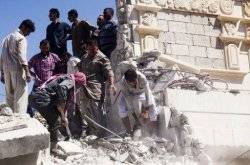Fighter jets have bombed a town in northern Syria, killing at least 18 people, activists say, while the new UN envoy to the country has acknowledged that brokering an end to the nation's war will be a "nearly impossible" task.
The Britain-based Syrian Observatory for Human Rights (SOHR) and the Local Co-ordination Committees (LCC), two anti-government activist groups, said the air strikes targeted a residential area in the northern town of al-Bab, about 30km from the Turkish border.
The SOHR put the death toll at 19, while the LCCs said that 25 people had been killed.
An amateur video showed men frantically searching for bodies in the rubble of a white building turned into a pile of debris.
The AFP news agency reported that a separate government airstrike on a house in Aleppo city had killed ten members of a family.
The bodies of the children were laid out under blankets in the back of a yellow pick-up truck outside the northern city's main hospital before a hurried funeral, the correspondent reported.
In Damascus, a car bomb exploded in a religiously mixed district on the edge of the city, causing casualties including women and children, state media and opposition activists said.
The LCC, which is a network of activists inside the country, said ambulances were ferrying wounded people from the scene in the Jaramanah neighborhood.
Elsewhere in Damascus, witnesses said that Syrian army bulldozers had flattened several houses in the western party of the city as a form of collective punishment targeting people's property in several areas hostile to President Assad.
"They started three hours ago. The bulldozers are bringing down shops and houses. The inhabitants are in the streets," said a woman who lives in a high-rise building overlooking the Tawahin district.
Anti-government groups also reported scattered violence in regions across the country on Monday, including the capital's suburbs, the region of Deir el-Zour in the east, Deraa in the south and Idlib and Aleppo in the north.
"This is an unprovoked act of collective punishment. The opposition fighters had left, there are no longer even demonstrations in the area," said Mouaz al-Shami, a campaigner collecting video documentation of the demolitions.
Uprising labelled 'conspiracy '
Diplomatic efforts to resolve the war have continued despite the violence. Algerian diplomat Lakhdar Brahimi, who recently succeeded Kofi Annan as the joint United Nations-Arab League envoy to Syria, told the BBC that the task is "nearly impossible".
Brahimi, speaking earlier to Al Jazeera, said change in Syria was "unavoidable", but he stopped short of calling for Assad to step down - the most important demand of the people.
Omran al-Zoabi, the recently appointed information minister, said the 17-month-long uprising, sparked by the government's violent response to protests in the city of Daraa, was "a conspiracy, an aggression by proxy, and its tools are hidden".
ICRC access sought
The new head of the International Committee of the Red Cross (ICRC) arrived late on Monday for a three-day visit that will include talks with Assad and other officials meant to increase the organization’s access in the country.
Peter Maurer will meet Assad on Tuesday, as well as Walid Muallem, foreign minister, and several other ministers. The ICRC president is also set to meet the head of his organization’s main partner in Syria, the Syrian Arab Red Crescent.
"At a time when more and more civilians are being exposed to extreme violence, it is of the utmost importance that we and the Syrian Arab Red Crescent succeed in significantly scaling up our humanitarian response," Maurer said in a statement.
"It is vital that we build on what has already been achieved on the ground."
The Syrian authorities have imposed severe restrictions on the operations of aid agencies despite the escalating crisis, and have rejected calls for the establishment of a humanitarian corridor.
"An adequate humanitarian response is required to keep pace with needs, which have been growing exponentially," Maurer said.
Despite the difficult working conditions, the ICRC said it and the Syrian Arab Red Crescent had provided nearly 180,000 people with food in the hardest-hit parts of the country since mid-July.
Since the beginning of the year, the two organizations have provided relief items to more than 800,000 people and have helped more than one million people access clean water, it said.
In Madrid, the main opposition Syrian National Council appealed on Monday to the international community for weapons and urgent military intervention to defend civilians from bombardment.
"We need a humanitarian intervention and we are asking for military intervention for the Syrian civilians," SNC chairman Abdel Basset Sayda said after meeting Spanish Foreign Minister Jose Manuel Garcia-Margallo.
"I have the duty of asking for weapons that will allow us to defend against the Syrian armor and weapons that are killing civilians all the time," he told a joint news conference.
PHOTO CAPTION
Syrian civilians clear loose debris from a destroyed residential building following an air strike by the Syrian army in Al-Bab in the northern province of Aleppo.
Aljazeera


 Home
Home Discover Islam
Discover Islam Quran Recitations
Quran Recitations Lectures
Lectures
 Fatwa
Fatwa Articles
Articles Fiqh
Fiqh E-Books
E-Books Boys & Girls
Boys & Girls  Hajj Rulings
Hajj Rulings Hajj Fatwas
Hajj Fatwas














